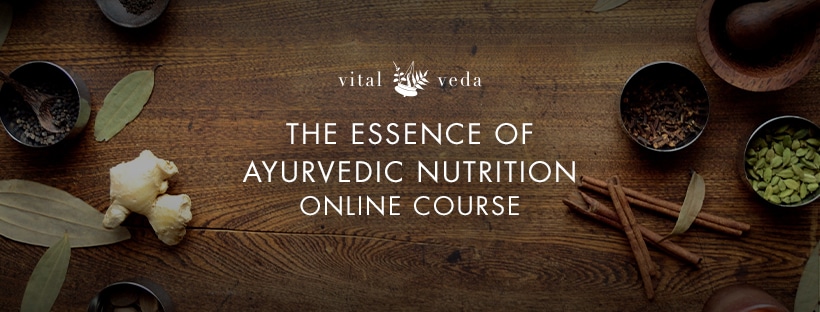Pizza + Ayurveda = Yes, Really
When people think of Ayurveda, they often imagine mung dal, herbal teas, and leafy greens – not wood-fired pizza dripping with mozzarella. But here’s the thing: Ayurveda doesn’t ban pizza. It simply asks how you eat it.
These Ayurvedic digestion tips are all about timing, food combining, and mindful eating. They help you turn pizza from a heavy indulgence into something your body can welcome.
I’m sharing how we make pizza Ayurvedic in my own home — using the principles of Ayurvedic nutrition (the laws of nature applied to food) so that pizza actually supports digestion rather than sabotaging it.
🍃 Want to apply Ayurveda’s principles to any cuisine — not just pizza?
Check out the Essence of Ayurveda Nutrition course. You’ll learn how to adapt Ayurveda to your unique constitution, climate, culture, and favourite foods.
1. Pizza is heavy — eat it at lunch
Pizza is rich: wheat dough, cheese, dense toppings. Ayurveda teaches that your digestive fire (agni) is strongest at midday (when the sun is the strongest), so that’s the ideal time for heavier foods. Dinner is when the sun goes down and your metabolism slows down. If you eat thick and heavy foods like pizza at night this often leads to bloating, heaviness, poor sleep, joint issues and essentially creates a blockage to healing any imbalance.
2. Add black pepper to cheese
Black pepper is an Ayurvedic classic light, sharp, hot and pungent spice for counter-balancing heavy, slow, cold and sweet dairy. It stimulates digestion, cuts through the mucus-forming qualities of cheese, and brings warmth to the gut. Just a light sprinkle can make pizza feel a lot less heavy.

3. Choose soft, fresh cheeses
In Ayurveda, fresh cheeses like ricotta, mozzarella, and burrata are gentler than aged, hard cheeses. They’re less salty, easier to digest, and keep the pizza lighter.

our homemade pumpkin, goats cheese and olive tapenade pizza
4. Use fresh, local, seasonal toppings
Freshly picked, seasonal vegetables carry abundant prāṇa — the vital life force. Local produce not only supports digestion, it also attunes your body to the environment you live in. Nature offers exactly what is needed to balance the elements and doṣas most active in that moment of the year. Basil — whether holy, Thai, or classic Italian — from your garden, and capsicum or peppers from the farmer’s market, are treasures of true wealth (artha) in Ayurveda.
5. Eat wheat freshly baked
Ayurveda teaches that grains are far lighter and easier to digest when eaten fresh. A pizza straight from the oven — like a just-made roti or chapati — is much gentler on the stomach than something reheated from the fridge. Even with sourdough bread, enjoy it only on the day it’s baked, ideally that very morning or lunch-time.
6. Sip thin lassi or buttermilk
This is my Ayurvedic twist on Italian indulgence. A light, spiced buttermilk or thin lassi helps digest almost anything heavy, thanks to its probiotic goodness, digestive-soothing qualities, and anti-inflammatory effects. It also hydrates the body and balances the generous saltiness that often accompanies Italian cooking. The perfect sidekick to pizza — or really any rich meal. Try my recipe, pour it into a bottle or thermos, and take it with you to your favourite restaurant.

7. Eat with love and gratitude
Your mental state is an essential part of digestion. Bless your food, eat with calm presence, and savour each bite. When your nervous system is in “rest and digest” (parasympathetic) mode, your body can process even indulgent meals with greater ease.
In contrast, being in “fight or flight” (sympathetic) mode, for example, eating while standing, rushing, or working at your computer, can impair your ability to digest, even if the food is the finest Ayurvedic preparation.
Ayurveda Doesn’t Say “No” - It Says “Yes, But Wisely”
By adjusting when you eat, how it’s prepared, and the mindset you bring to the table, pizza night can be more than just an indulgence, it can be a nourishing, digestively supportive experience.
These same Ayurvedic digestion tips for pizza apply to countless other meals. Whether it’s a Sunday pasta lunch, homemade sourdough, or your favourite cultural comfort food, the principles are the same: work with your body’s rhythms, not against them.
Conclusion & Frequency of Eating
These tips and transformative tweaks make pizza lighter and easier to digest, but it’s still a rich meal, mainly because of the cheese. Even with these Ayurvedic adjustments, I generally wouldn’t recommend enjoying it more than once a week.
Take away the cheese, however, and it becomes a whole new experience. A lighter, plant-based pizza with fresh, seasonal toppings can be part of your menu more often without putting the same strain on your digestion.
In Ayurveda, moderation is a kind of medicine. Enjoy your pizza mindfully, savour it fully, and let it be one of those meals you truly look forward to, not just another bite in the weekly rush.
Apply This to Any Cuisine
If you love the idea of making your favourite foods work with your body instead of against it, you’ll love the Essence of Ayurveda Nutrition course.
This program is designed to help you:
Understand the principles (laws of nature) behind Ayurvedic nutrition.
Adapt Ayurveda to any cuisine, tradition, climate, or dietary preference.
Eat in a way that supports your current state of constitution (vikṛti).
Confidently bring Ayurveda into everyday life without giving up the foods you love.
When you know the why, you can adapt the how. That’s how pizza, pasta, ramen, or a home-cooked roast veggies can all be part of a diet that leaves you energised and balanced.
Over to You
I’d love to know — what’s your “naughty but nice” food? The one you’d love to make more Ayurvedic without losing the fun? Drop it in the comments and it might just be the star of the next post.
In the meantime, try one (or all) of these pizza tips and notice how much better you feel afterwards. Your belly, and your taste buds, will thank you.










